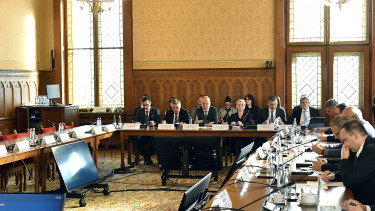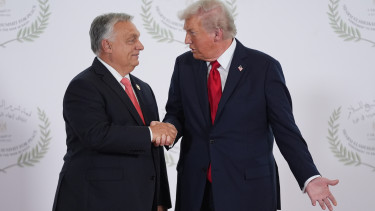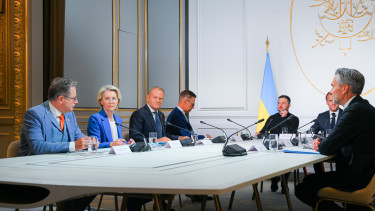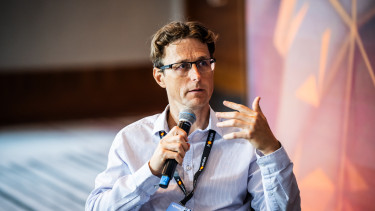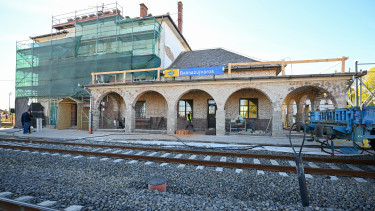Who is this mother of seven and what can we expect from her at the helm of the European Commission?

The new president didn’t come from obscurity, she led three ministries in one of the most important member states of the Union, and was thus member of the Council of the European Union in three „configurations”: social and family matters, employment and lately, defence. She was regular guest at the Davos World Economic Forum also. She was the heir-designate of chancellor Merkel for a while but she couldn’t really succeed in „shaking up” the German army, the Bundeswehr, she got even entangled into further scandals. It can be attributed to the failure at the helm of the army that now someone else is the candidate (who just received the defence portfolio as well) and the same can be the reason that she freaked out totally undiplomatically and condemned wholesale the morale of the army when it turned out that an officer led a "double life” – Syrian refugee in one and planning attacks in the other. The other scandal, whose waves have not subsided yet – a parliamentary investigation is in progress –, is around about hundred and fifty million euros worth of consulting contracts in her ministry. The consultants drawing in further externals and an erasure of data – although all data were restored afterwards and access controls strengthened – in the ministry is one part of the scandal. It is also alleged, however, that the necessity of employing the consultants and its efficiency was not checked before contracting and 44 of the 56 contracts were awarded directly according to research by the magazine “der Spiegel”. A practice not unknown in Hungary, that some consultants did provide an invoice as entrepreneurs but were not independent, a hidden employment relationship, counts as tax fraud in Germany. When this came to light, of course the problems were immediately remedied.
The amount of these contracts is small compared to the total defence budget, and although the volume of consulting contracts has increased significantly, to 134 million euros from 83, material expenses of the ministry also grew from 3 to 14 billion euros during the same period. The direct implication of the minister was not raised, only her (significant) political responsibility. And it was the ministry itself who reported to the prosecutor that members of the Staff Council received “favours” from the consultants. It is more serious that the trespassers were confidents of von der Leyen, who were employed by consulting companies before, thus the conflict of interest could have been suspected. State secretary Karin Suder, ex-manager of McKinsey endorsed a contract personally in one case while in other cases her direct reports authorised them.
In spite of that it is a general view that von der Leyen tried to prevent the corruption and “macho-practices” which reigned – according to gossip – in the military.
She was progressive as minister of social and family affairs and she is thought to have played an important role in the “socialdemocratisation” of the CDU, its shift to the left what led – beyond the role of the SPD as member of the “grand coalition” in the austerity measures – to the weakening of the Social Democrats in Germany.
Asking the question how independent and strong a politician she is, it is known that she ran twice “head against the wall”: once she succeeded in having the female quota accepted against Merkel (remember, she is considered to be “the creature of Merkel”) by threatening to do it even with the votes of the socialists and the greens.
Merkel, however, faced the “VDL method” already in February 2007 (when von der Leyen was minister of social and family affairs). The chancellor could read in the newspaper that her minister would like to increase the number of available places in childcare institutions to half a million. Merkel didn’t know about this, nothing like that in the coalition agreement, and financing also unclear. It is not difficult to imagine, how this doesn’t fit the conservative Christian Democrat line. Von der Leyen had a ready answer to the immediate phone-call by Merkel: “let this fall onto my head”. This impressed the chancellor.
As minister she succeeded on getting through the branch-specific minimum wage and the education support for poor children (containing a free lunch, tutoring and music training).
About the past: she is member of the CDU since 1990, became minister of family affairs (female, family and health) of Lower-Saxony and is member of the board of the CDU since 2004. Federal minister of family affairs since 2005 where she introduced (beyond what has already been mentioned) the “parents’ money”. When, in 2009, she left the family ministry to take over labour, some of her colleagues were in tears according to radio reports, and not from joy…
We can see a middle-of-the road, independent-thinking politician, who cannot always get her way successfully, though.
She became vice-president of the CDU with just 69% of the votes. This can be interpreted as a slump in her popularity, but according to some analysts this only shows that she lacked the power within the party to succeed Merkel anyway.
Her plagiarism-affair has to be mentioned, she did not properly indicate in her PhD thesis where she quoted the work of others, but the investigation of the university came to the result that this did not mean that she claimed that these were hers, the quality of her own research was satisfactory, these quotes were not used to replace own work.
Opinions on how successful her measures were are differing and she has a controversial relationship with the socialist party.
The baby-boom expected from the measures supporting parenting did not materialise. In the last months of 2008 birth rates went down. They were extremely high, nevertheless, in 2007 (but not compared to 2005) and decreased again during the crisis and reached the level of 2005-2007 only by 2013. Since there is an increase but a little decrease again in 2017. This hectic change is evidently not suitable to draw clear conclusions.
The strengthening of childcare institutions and the support to parents were well received by the socialists, they couldn’t find anything to blame her for as minister of labour either. Unions and poverty alleviating NGOs lauded the above measures and then felt deceived. The reason is that when the “Harz-IV” rates, supporting the poorest of the unemployed, were recalculated, the SPD tripped her up, the increase became 5 euros instead of the 364 calculated by her ministry.
She could not achieve a breakthrough – at least partially for reasons outside her control – in the defence ministry. A small detail, that once she was photographed by a “paparazzo” looking far ahead, leaning on the wing of a fighter plane. As a set picture, this would have been unacceptably pompous, in particular taking into account the moderate success achieved, and she was of course blamed for that also.
There are of course a lot who would like to influence the programme and many of those she has to listen to. Many of these claim that she can thank her election to them (at least one Italian governing party, the Fidesz-delegation but also German opposition parties). We Hungarians know well that “gratitude is not a political term” or as Politico put it: “But show me a politician who doesn’t have debts or enemies and I’ll show you a politician who never became Commission president”. The Commission was voted with significantly larger majority then her as president, but the more diverse Parliament means that the MEPs have “smelled blood”, they feel their power and hard bargaining can be expected around each initiative.
The not so long (and winding) way to the top
Surprise, surprise: the ex-successor-to-be of Angela Merkel became candidate for president of the European Commission. Defying the “lead candidate” system, but choosing someone from the ranks of the party gaining the most votes in the European Elections. The original lead candidate of the EPP was not suitable (too cosy with Orbán? no government experience?), the lead candidate of the second runners too strong (and not one of the EPP). That it was Macron and Orbán who were the strongest opponents of the first two candidates, maybe will define some of the politics of the new Commission. The candidates of both (and that of Romania) for commissioner were voted down by the Parliament Committees – for different reasons, though.
After her nomination, she has to negotiate with all member states about the person and portfolio of the commissioners (this is not just a politically hard chess-match but also a technical “puzzle game” as the professional background of the persons proposed by far doesn’t cover the distribution of portfolios in the Commission) and had to work out her programme in detail (her political guidelines prepared before her audition in the European Parliament can be found here.) Like her predecessor, Juncker, she also handed over to each commissioner-designate a “task list”.
She promised to give the Parliament quasi-initiating power. Formally (and till now, also practically) only the Commission can initiate legal acts, and – if the negotiations don’t go as expected – can also withdraw them. This, nevertheless, was rather used to diminish the legislative burden (the Juncker Commission withdrew a number of initiatives which were stuck) than a bargaining chip. Now von der Leyen promised that if the Parliament passes a resolution calling for legislative action, the Commission will deal with it.
Back to the setup of the Commission and the rejection of three of the by the Parliament. To replace a commissioner-designate is not new. It was more before the vote of the parliamentary committees, of which we also had an example, that of the Polish candidate, due to the incompatibility of the person and the proposed portfolio. The agriculture portfolio was sufficiently attractive for Poland to change the person.
It is the first time, however, that three of them were outright voted down. In former Commission nomination procedures, usually a change of portfolio was enough. This was also aired for the second Hungarian candidate, but finally Romania came to the rescue: its nomination of Adina Vǎlean as second option saved, at least partially, the gender balance in the Commission and the Romanian candidate was also more suitable for the post of the transport commissioner, so the original portfolio allocation remained.
Von der Leyen was nevertheless forced to agree some concessions. Her setup of the Commission surprised many, as the lines of responsibility are somewhat blurred, the portfolios – in particular those of the executive vice presidents and the vice presidents – are tied more to political objectives than to areas of activity. Some areas were seen as without a proper owner – culture, social, fisheries were thus added to the names of the portfolios of Mariya Gabriel, Nicolas Schmit and Virginijus Sinkevičius. There was also another reason, however, that she was forced to rename a portfolio: Margaritis Schinas was given the portfolio: “Protecting the European Way of Life”. This was considered racist and therefore will be called now “Promoting our European Way of Life”. These changes were the pre-condition for some center-left groups to support the new Commission. The Socialists indeed kept their promise: 137 for, 1 against and 9 abstentions (against from Germany, abstentions from Germany, France and Romania and one from Belgium). The Greens collectively abstained – 58 abstentions, 5 for, 9 against, with no clear nationality trend).
On Sunday, 1 December, the new Commission took office. Expect interesting times ahead.


